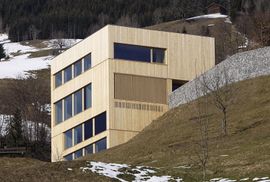Community center St. Gerold
Aus Smart Places Network
| Principal | Community of St. Gerold | |
|---|---|---|
| Address | ||
| Energy planning | ||
| year fo finalisation | ||
| Construction costs € brutto | ||
| Base area[m²] | ||
| Useful area[m²] | ||
| Cubage [m³] | ||
| Heating demand [kWh/(m²BGFa] | ||
| Heatingsystem | geothermal heat | |
| Technical data other object types | ||
| Project description | The community centre of Sankt Gerold represents a somewhat alien structure in an Alpine landscape steeped in tradition. It is probably a box, but what a box! The first four-storey wooden building in Vorarlberg, with a lift construction and lining made of glued wood, built from local timber only by local companies and ecological all round. On the street side, only two storeys protrude. A village shop is on the ground floor, the wooden staircase leads up to the town hall. Buried in the hillside, facing the landscape, are the kindergarten and playgroup. Inside as well as outside, the building's appearance is dominated by silver fir. The construction and façade were made with wood from the community's own forest; the floor, walls and ceilings were made from trees that grew in Vorarlberg. The use of local building materials not only reduces material cycles and thus grey energy, it also promotes the local economy and strengthens regional identity. All materials were tested for all harmful substances of concern in the manufacturing process and their installation was checked on site. Three potentials were put under the microscope: Primary energy content, CO2 emissions and acidification. Only PVC-, H-, CFC- and HFC-free building materials were used, and sheep's wool and wood fibre insulation were used instead of mineral wool. | |
| Construction material timber | ||
| Planning | cukrowicz nachbaur architekten zt, Bregenz | |
| Construction processing | Nigsch Holzbau, Blons, carpentry Heiseler, Sonntag, carpentry Berchtel, Schnifis | |
| Information on regionality | "You just have to want it and it works! It makes sense to have wood that can be cut from your own forest. During the planning phase, it was already clear that it would be a wooden building and that as much wood as possible should come from the community forest. About 85 percent of the wood used comes from the region. The silver firs were felled in winter, sawn and dried in the valley. Regional carpenters prefabricated the timber construction elements. The added value remained in the valley. It would have been cheaper to buy sawn timber. But the short distances were more important to us | |
| Further information | ||

